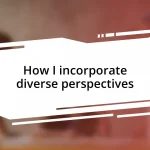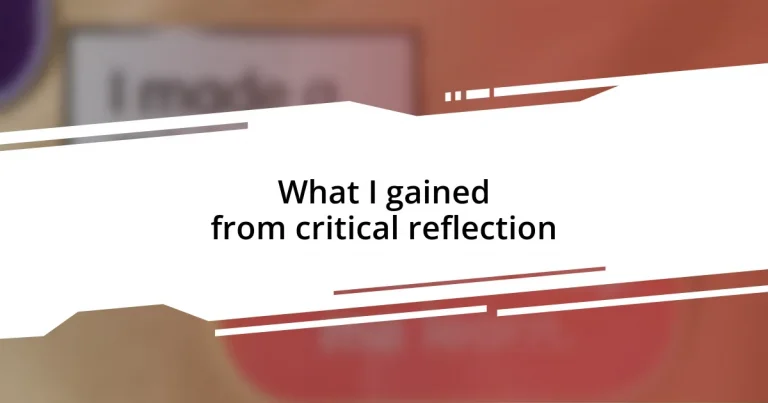Key takeaways:
- Critical reflection enhances self-awareness by revealing motivations and patterns of behavior, leading to personal growth.
- Embracing discomfort during reflection helps uncover valuable insights and transform failures into learning experiences.
- Creating a conducive environment for reflection, journaling experiences, and seeking feedback from peers can deepen understanding and foster growth.
- Measuring personal growth involves recognizing subtle changes, celebrating small victories, and transforming challenges into opportunities for resilience.
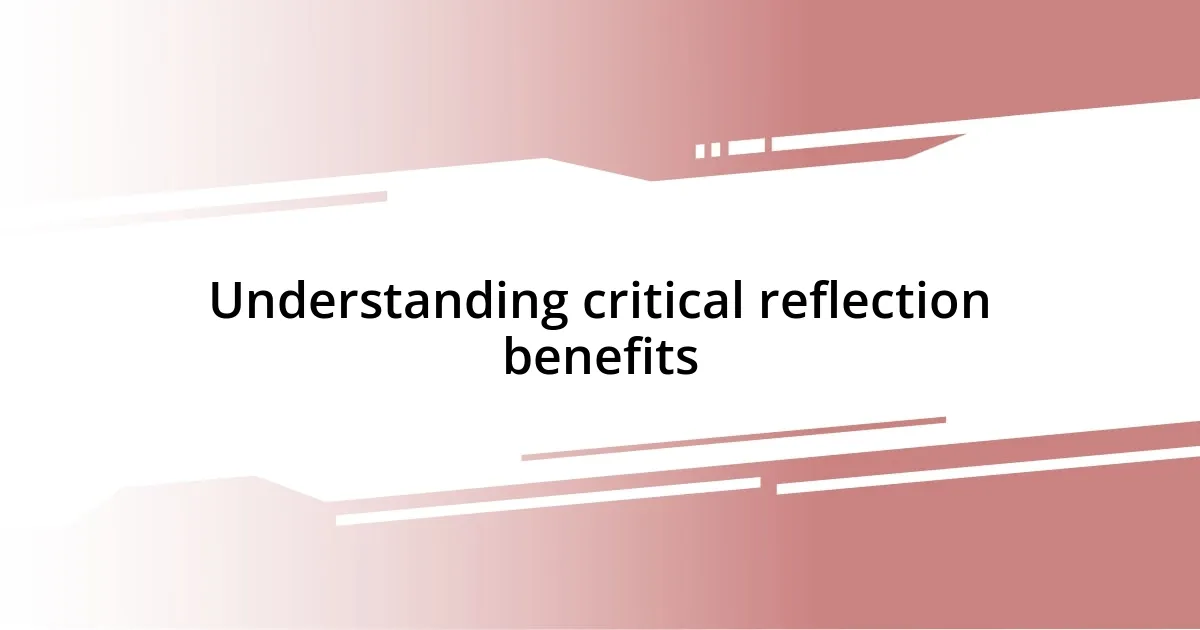
Understanding critical reflection benefits
Critical reflection offers a unique opportunity to dive deep into my experiences, often revealing insights I may have missed during the initial moment. I remember a time when I felt overwhelmed after failing a project at work; I was so caught up in disappointment that I didn’t consider what it could teach me. By stepping back and reflecting on what went wrong, I realized that the failure was a crucial stepping stone toward growth, transforming my frustration into a learning experience.
One of the most profound benefits of critical reflection is the enhancement of self-awareness. I’ve found that regularly reflecting on my actions and their outcomes allows me to better understand my motivations and patterns of behavior. When I asked myself why I reacted defensively during a team meeting, I uncovered underlying insecurities that I hadn’t previously acknowledged, opening the door to personal development. Isn’t it fascinating how understanding ourselves can lead to becoming a better version of who we are?
Moreover, critical reflection fosters better decision-making. I often find that when I take the time to analyze past choices, the clarity gained informs my future actions. For instance, after reflecting on a decision that negatively impacted my team, I learned to consider not just the outcomes but also the team dynamics at play. How many times have we jumped into decisions without considering the bigger picture? This process of understanding allows me to navigate my professional world with more confidence, shaping not only my path but also positively influencing those around me.
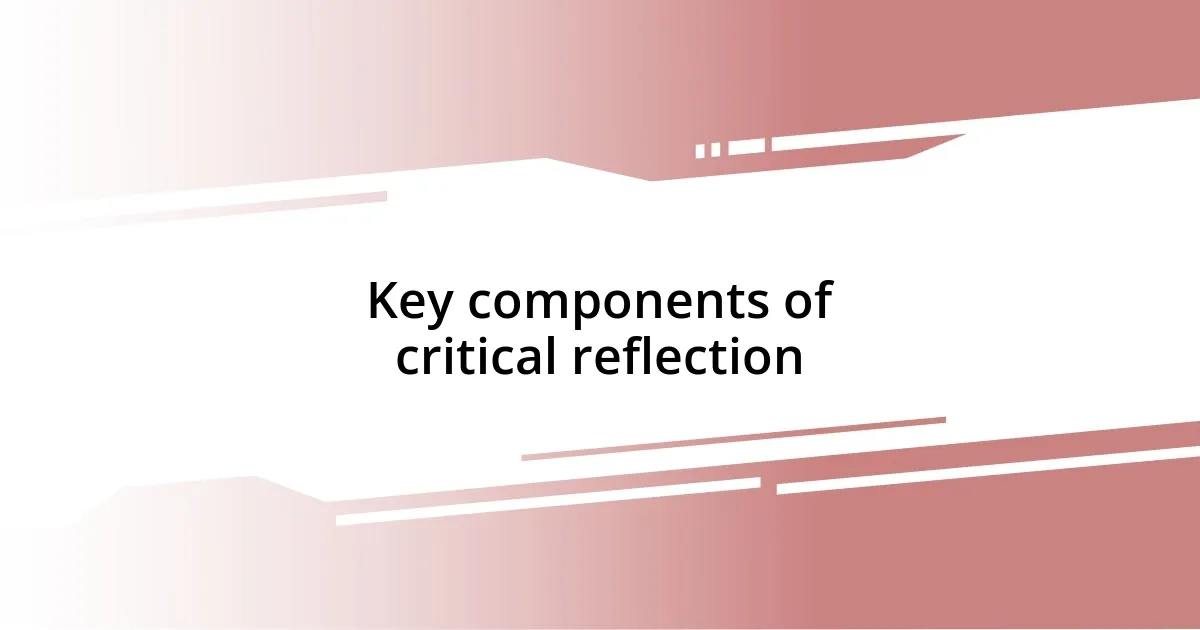
Key components of critical reflection
Critical reflection consists of several key components that have personally transformed my understanding of experiences. One of the most essential elements is the willingness to be open and honest with oneself. When I faced a significant setback in my career, it was tempting to brush it off as just bad luck. However, by embracing vulnerability and confronting my feelings, I began to unlock deeper truths about my reactions and decisions. This openness was crucial for my growth.
- Self-Awareness: Recognizing my feelings and motivations during reflections.
- Analysis of Experiences: Delving into what transpired and why it mattered.
- Lessons Learned: Extracting valuable insights to inform future actions.
Another vital aspect is embracing discomfort. There have been moments when reflecting on my failures felt like rummaging through a painful memory box. Yet, each uncomfortable thought pushed me to rethink my approach and open my mind to new possibilities. I remember grappling with the embarrassment of a public presentation gone wrong; instead of shying away, I dissected what went wrong. It was uncomfortable, yes, but it allowed me to see that the crowd’s reaction didn’t define my worth as a speaker. This practice of dissecting unpleasant experiences has helped me grow immensely in both personal and professional contexts.
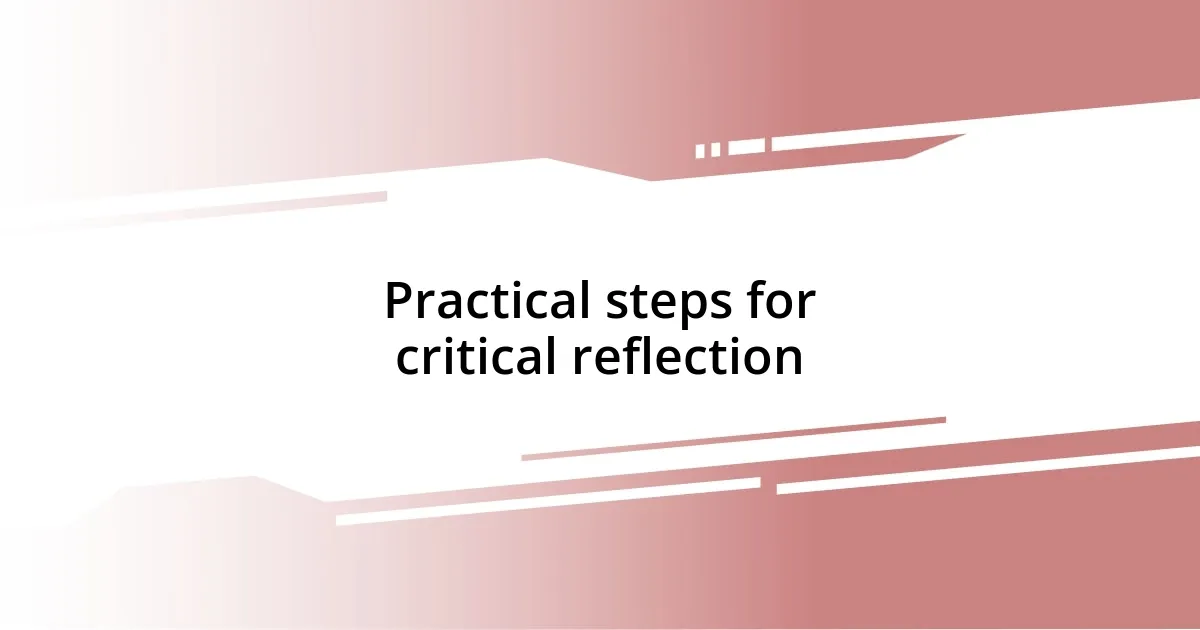
Practical steps for critical reflection
When it comes to practical steps for critical reflection, creating a conducive environment is key. I find that having a quiet space where I can think without distractions enhances my ability to delve deeper into my thoughts. Recently, I set aside one evening a week to reflect on my day in a serene corner of my home. The calmness I felt during this time allowed me to be more honest with myself, leading to moments of clarity that I hadn’t anticipated.
Another effective step I’ve adopted is journaling my experiences. I remember the first time I put pen to paper after a challenging day at work. As I wrote about my frustrations, the act of externalizing my thoughts helped me see my emotions from a different perspective. I often ask myself guiding questions, such as, “What could I have done differently?” or “How did my actions affect others?” This technique not only aids in processing my feelings but also encourages me to acknowledge my growth over time.
Lastly, seeking feedback from trusted peers is a step I highly recommend. Sharing my reflections with friends or colleagues often uncovers insights that I might have overlooked. I think back to a discussion I had with a mentor who pointed out strengths I hadn’t recognized in myself. Their perspective reshaped my self-image and motivated me to pursue new opportunities. Engaging in this dialogue reinforces the idea that reflection isn’t just a solo journey; it becomes richer when shared.
| Practical Steps | Benefits |
|---|---|
| Creating a Conducive Environment | Enhanced honesty and clarity |
| Journaling | Externalizes emotions and promotes growth |
| Seeking Feedback | Provides new perspectives and insights |
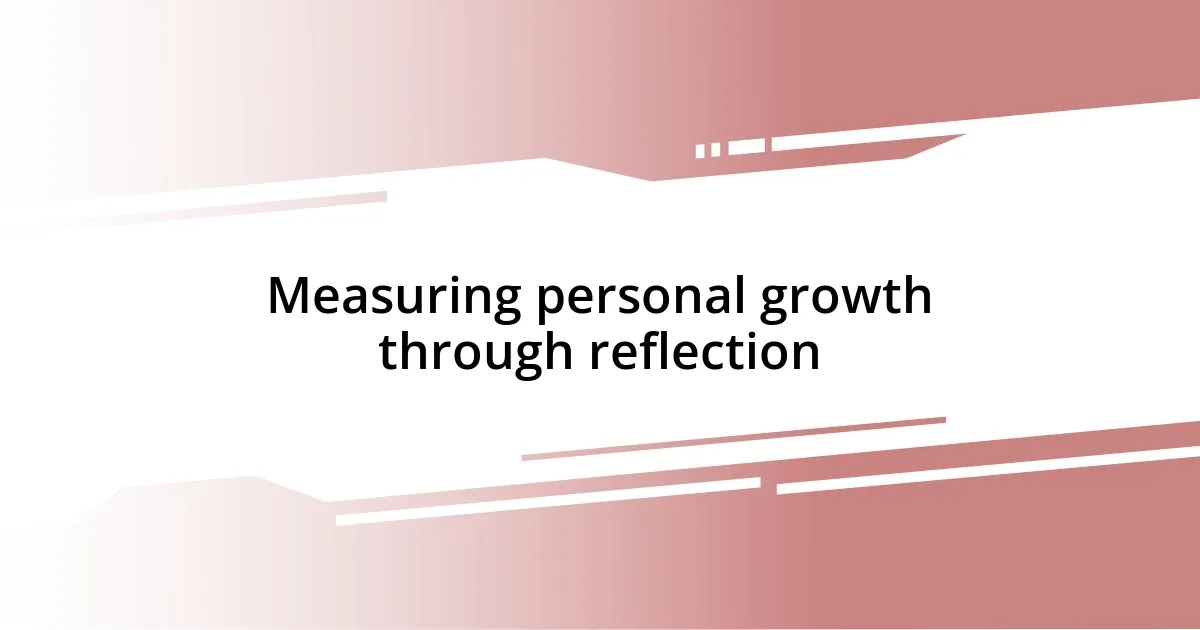
Measuring personal growth through reflection
Measuring personal growth through reflection is more than just counting the moments of clarity; it’s about recognizing the nuances of how those moments affect our lives. I can’t help but think back to a difficult conversation I had with my boss that left me feeling unsettled. By reflecting on that experience, I discovered not only my triggers but also areas for improvement in my communication skills. Was it uncomfortable to dissect my feelings? Absolutely, but it paved the way for meaningful growth.
In my journey, I learned to quantify personal growth by setting benchmarks during my reflective practice. After a particularly challenging project, I asked myself specific questions: “What did I learn about my capabilities?” and “How have I changed since this experience?” This isn’t just idle pondering; it’s a way to track progress. One time, after months of diligent reflection, I realized I was much more resilient than I previously thought. Connecting the dots of my experiences helped me see this newfound strength.
Another element I value in measuring growth is celebrating small victories. I remember the day I received positive feedback from a client after weeks of uncertainty about my work. In reflecting on this, I recognized the growth in my ability to manage relationships and expectations. It made me wonder: why do we often overlook these subtleties? Emphasizing these little wins helps me keep my motivation high and reinforces that my journey of growth is ongoing, not just a destination.
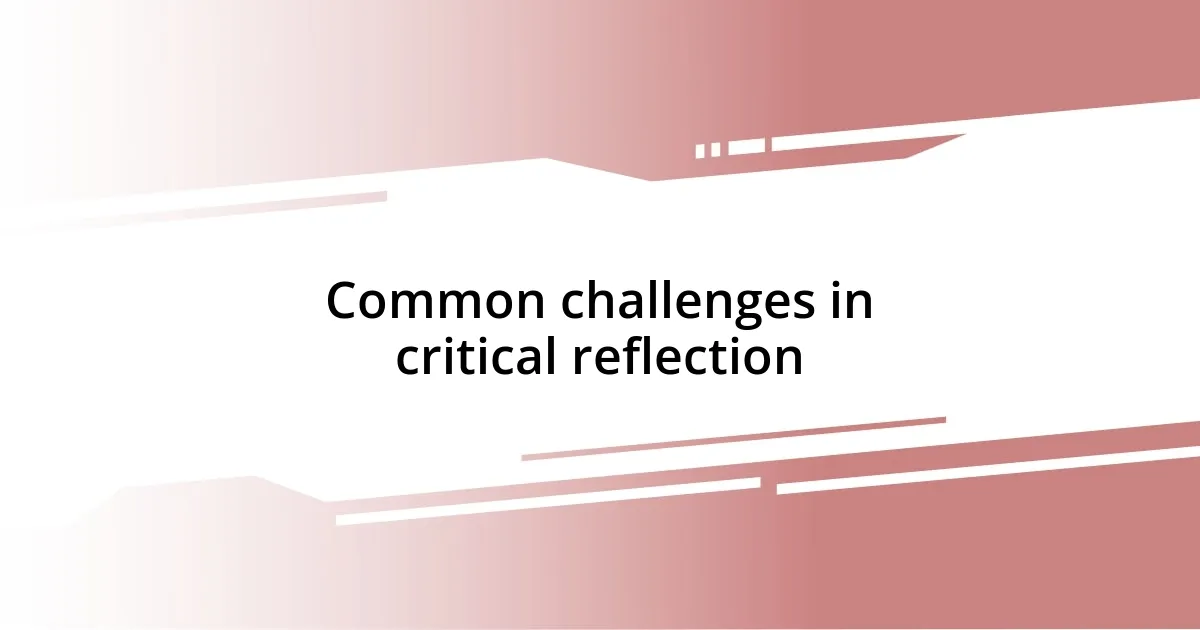
Common challenges in critical reflection
Common challenges in critical reflection can often stem from our internal resistance to confronting uncomfortable truths. I vividly remember a time when I hesitated to explore a failure at work that had left me disheartened. The discomfort of facing my shortcomings almost made me abandon the reflection altogether. But I gradually realized that confronting these feelings is a vital step toward genuine growth.
Another significant challenge is the tendency to skim over important details and generalize experiences. I found myself doing this after a stressful team project that didn’t pan out as planned. Instead of diving into the specifics, I brushed it aside as “just a bad experience.” However, when I finally took a moment to dissect what actually happened—why communication broke down or where expectations were misaligned—I unearthed valuable lessons that transformed my approach in future projects.
Lastly, a common barrier can be the overwhelm of emotions that reflection can evoke. I recall a moment during my reflection on a personal loss, when the weight of my grief felt insurmountable. It made me want to shy away from the process entirely. Yet, I learned that addressing these emotions can be liberating. Embracing vulnerability in these moments led to deeper insights about resilience and the strength I possess in overcoming adversity. How often do we allow ourselves that vulnerability? I’ve learned that acknowledging our feelings is not a roadblock but a pathway to richer understanding.
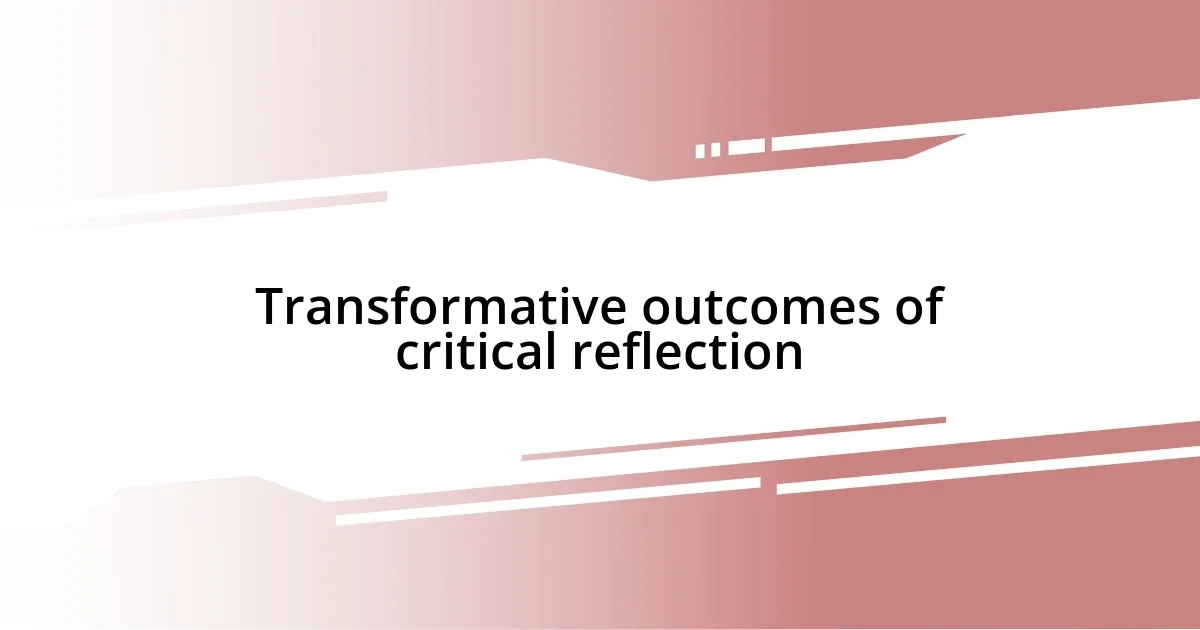
Transformative outcomes of critical reflection
Transformative outcomes of critical reflection yield profound insights that often reshape our perspectives. I recall a moment when I reflected on my leadership experiences during a particularly tumultuous project. Initially, I viewed my role as purely functional, ensuring tasks were completed. However, digging deeper, I realized that my impact lay in how I supported and inspired my team during stressful times. This shift in perspective not only transformed my approach to leadership but deepened my connection with my colleagues. Has anyone else experienced that lightbulb moment where a simple reflection changed everything?
The most striking outcome I’ve encountered is a sense of clarity that emerges from critical reflection. After grappling with a series of setbacks, I took time to dissect my feelings and reactions, which led me to a stark realization: I was avoiding certain projects out of fear, not incompetence. This revelation sparked a courageous decision to step out of my comfort zone. How empowering is it to turn fear into fuel for growth? That process not only transformed my approach to challenges but also reignited my passion for my work.
Finally, I’ve come to appreciate the immense value of cultivating empathy through reflection. A vivid memory surfaces when I think about a disagreement with a friend, which left me feeling justified in my position. Upon reflection, I started to understand their perspective and what motivated their actions. This newfound empathy didn’t just mend our relationship; it expanded my social awareness. Isn’t it fascinating how critical reflection can foster connections? Engaging in this practice has opened my eyes to the richness of interpersonal interactions, reinforcing that understanding others is a vital part of personal growth.
